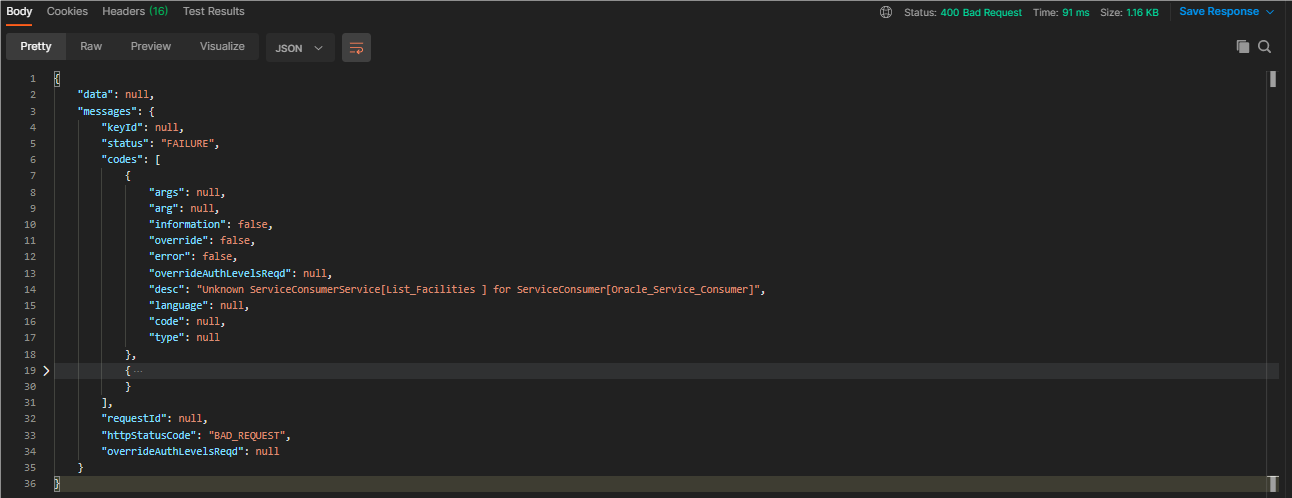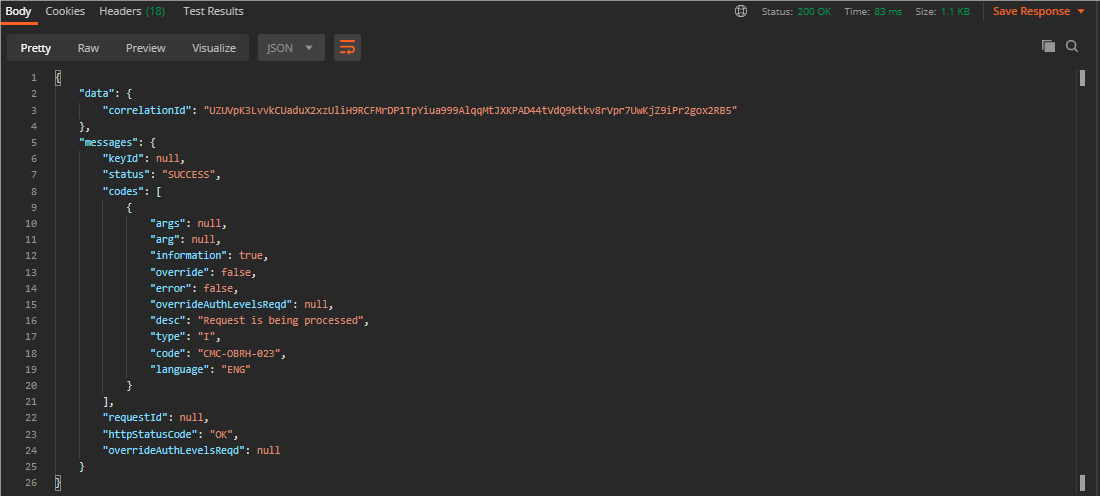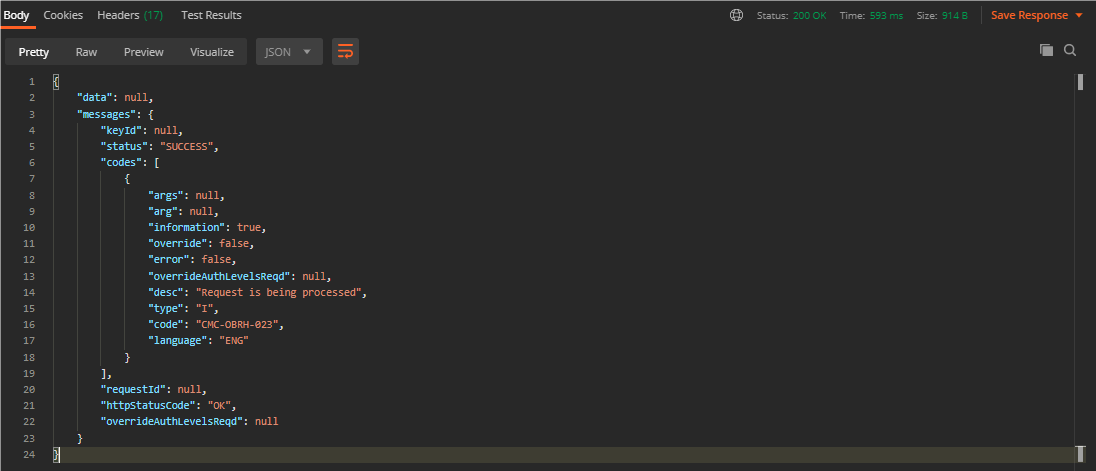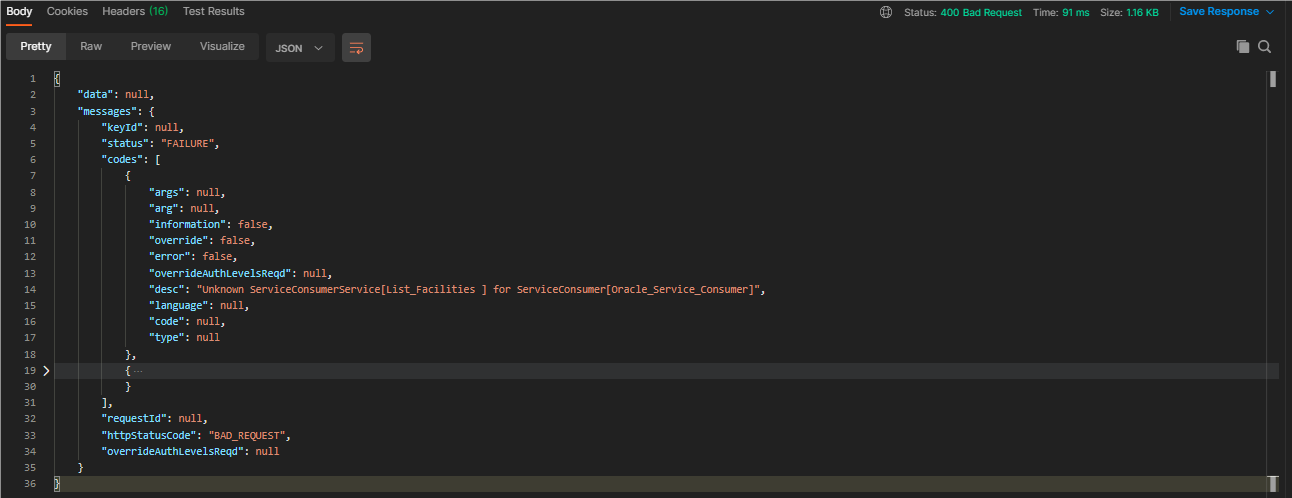17 Oracle Banking Routing Hub Integration Specification
This topic provides information about Oracle Banking Routing Hub Integration Specification.
- Token Generation
This topic provide information about the Token Generation. - Synchronous Dispatch API Specification
This topic provide information about the Synchronous Dispatch API Specification. - Asynchronous Dispatch API Specification
This topic provide information about the Asynchronous Dispatch API Specification. - Asynchronous Dispatch Response API Specification
This topic provide information about the Asynchronous Dispatch Response API Specification. - Template evaluation API Specification
This topic provide information about the Template evaluation API Specification.
17.1 Token Generation
This topic provide information about the Token Generation.
- Path: /platojwtauth
- Headers:
- appId : SECSRV001
- Content-Type : application/json
- Request
Body:
{ "username": "", "password": "" }- Username and password is base64 encoding of plaintext.
- Response
Body:
{ "token": “”, "userAlreadyLoggedIn": “Y”, "expires_in": 3180, "home_entity_id": "DEFAULTENTITY", "multi_entity_admin": "N", "multi_entity_admin_locale": “” }
Refer the below sample screenshots:
Parent topic: Oracle Banking Routing Hub Integration Specification
17.2 Synchronous Dispatch API Specification
This topic provide information about the Synchronous Dispatch API Specification.
Dispatch endpoint is the single entry-point for invoking the routes configured in Oracle Banking Routing Hub for services of a Service Consumer.
- Method: POST / GET
- Path: /route/dispatch
- Headers:
- appId : CMNCORE
- entityId : DEFAULTENTITY
- userId : <user id>
- branchCode : <branch code>
- Authorization : Bearer <Token>
- SERVICE-CONSUMER : <name of service consumer>
- SERVICE-CONSUMER-SERVICE : <name of service consumer service>
- Request Body:
- Any valid JSON/XML payload or multipart request which shall act as input to the transformation template in request transformer.
- Response
Body:
{ "data": {} "messages": {} }- If the route invocation succeeds, data JSON member would contain the transformed (optional) response of the provided service. If it is a provided web service and no response transformation template is supplied, XML Soap Body of response would be converted into JSON object and sent in data JSON member.
- If the route invocation fails due to misconfigured route or connection time out to ServiceProviderImpl or some other reason, relevant error messages would be sent in messages JSON member. In that case, data JSON member would be null or empty.
Examples: Refer the below screenshots of route dispatch for Service-Consumer Oracle_Service_Consumer and Service-Consumer Service List_Facilities.
Figure 17-6 Response Payload on Successful Dispatch
Figure 17-7 Response Payload on Failed Dispatch
Parent topic: Oracle Banking Routing Hub Integration Specification
17.3 Asynchronous Dispatch API Specification
This topic provide information about the Asynchronous Dispatch API Specification.
Dispatch endpoint is the single entry-point for invoking the routes configured in Oracle Banking Routing Hub for services of a Service Consumer.
- Path: /route/dispatch
- Query Params:
- isAsync : true
- Headers:
- appId : CMNCORE
- entityId : DEFAULTENTITY
- userId : <user id>
- branchCode : <branch code>
- Authorization : Bearer <Token>
- SERVICE-CONSUMER : <name of service consumer>
- SERVICE-CONSUMER-SERVICE : <name of service consumer service>
- Request Body:
- Any valid JSON/XML payload or multipart request which shall act as input to the transformation template in request transformer.
- Response
Body:
{ "data": { “correlationId” : “” }, "messages": {} }
Example: Refer the below screenshots of route dispatch for Service-Consumer Oracle_Service_Consumer and Service-Consumer Service List_Facilities.
Parent topic: Oracle Banking Routing Hub Integration Specification
17.4 Asynchronous Dispatch Response API Specification
This topic provide information about the Asynchronous Dispatch Response API Specification.
- Path: /route/dispatchResponse/{Correlation-Id}
- Correlation-Id will be coming from the response of dispatch endpoint.
- Headers:
- appId : CMNCORE
- entityId : DEFAULTENTITY
- userId : <user id>
- branchCode : <branch code>
- Authorization : Bearer <Token>
- Response
Body:
{ "data": {} "messages": {} }- If the route invocation succeeds, data JSON member would contain the transformed (optional) response of the provided service. If it's a provided web service and no response transformation template is supplied, XML Soap Body of response would be converted into JSON object and sent in data JSON member.
- If the route invocation fails due to misconfigured route or connection time out to ServiceProviderImpl or some other reason, relevant error messages would be sent in messages JSON member. In that case, data JSON member would be null or empty.
Example: Refer the below screenshots of route dispatch for Service-Consumer Oracle_Service_Consumer and Service-Consumer Service List_Facilities.
Figure 17-13 Response Payload when request is still processing
Figure 17-14 Response Payload when request is processed (on Successful Dispatch)
Figure 17-15 Response Payload when request is processed (on Failed Dispatch)
Parent topic: Oracle Banking Routing Hub Integration Specification
17.5 Template evaluation API Specification
This topic provide information about the Template evaluation API Specification.
Template evaluation endpoint will return the evaluated output of transformation template.
End-user can validate the template based on the returned output.
- Method: POST
- Path : /template/evaluate
- Headers:
- appId : CMNCORE
- entityId : DEFAULTENTITY
- userId : <user id>
- branchCode : <branch code>
- Authorization : Bearer <Token>
- SERVICE-CONSUMER : <name of service consumer>
- SERVICE-CONSUMER-SERVICE : <name of service consumer service>
- SERVICE-TRANSFORMATION : <name of service transformation>
- Query Parameters:
- transformationType : REQUEST / RESPONSE / MOCK_RESPONSE
-
Note:
Default value is REQUEST if not specified.
- Request Body:
- Any valid JSON / XML payload which shall act as input to the transformation template in request transformer.
- Response Body:
{ "data": {} "messages": {} }
Parent topic: Oracle Banking Routing Hub Integration Specification














